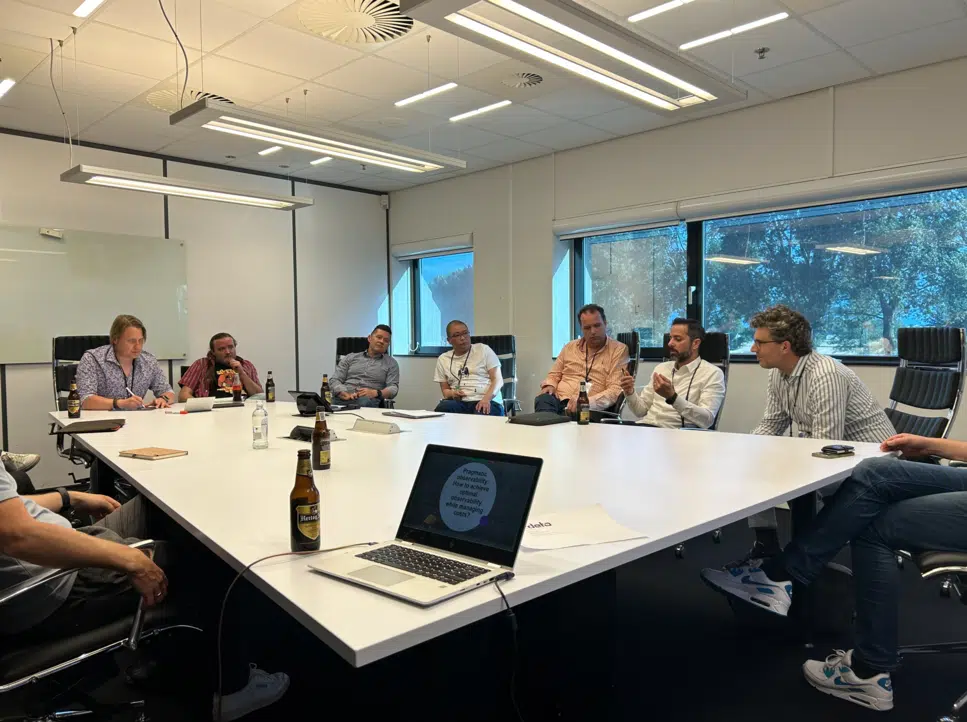If you have worked hard to polish your DevOps skills, and scored yourself an interview for your dream job, then ensuring you are adequately prepared for the interview is key.
After all, getting a potential employer to notice your CV is half of the battle. Once you’re speaking with them in the interview, it’s undoubtedly much easier to demonstrate your knowledge, skills, and overall suitability for the role.
With the increasing number of DevOps roles entering the market, when find your dream job, you want to be sure that you can meet the employers’ expectations, impress and, ultimately, be offered the position.
Whilst you can never fully predict the questions that will be asked, we’ve pulled together 10 of the most common DevOps interview questions and how to answer them, to help you prepare.
1. What do you know about DevOps?
Your answer to this should be simple and straightforward. Use it as an opportunity to prove your general knowledge of not only what DevOps is, but also to demonstrate an understanding of how and why it came about.
Begin by explaining the growing importance of DevOps in the IT industry and discuss how the approach aims to bring together the efforts of the development and operations teams in order to accelerate the delivery of software with, crucially, minimal failure rate.
2. Why has DevOps gained prominence over the last few years?
This question is designed to gauge whether a DevOps candidate has an awareness of the place of DevOps within the industry. Discuss its growing popularity in light of the success it has brought to high-profile businesses.
For instance: Facebook’s continuous deployment and code ownership models have helped it scale up whilst ensuring quality of experience at the same time. Hundreds of lines of code are implemented without affecting the quality, stability and security. Similarly, Netflix streams online content to more than 100 million users worldwide and for this they require fully automated and accelerated application deployment.
Drawing on these examples will enable you to demonstrate your understanding of DevOps as being vital to higher success rates, reduced lead time between bug fixes, continuous delivery through automation and an overall reduction in manpower and costs.
3. Which are some of the most popular DevOps tools and do you have experience working with any?
Some of the more popular DevOps tools include: Selenium, Puppet, Chef, Git, Jenkins, Ansible and Docker. It should go without saying, but don’t claim to have experience in tools you actually have none in, it’s a sure-fire way to get caught out later on in the process when they assess your technical skills.
Instead, comment on which tools you have specialisation in, what their abilities are and why you prefer using them. Then, show your willingness to expand your knowledge and skillset by noting that you are keen to work with alternate tools in the future.
4. What is the most important thing DevOps has helped us achieve?
Although down to personal preference, if you’re short of an answer for this it is a safe bet to maintain that the most important thing that DevOps helps us achieve, is to get the changes into production as quickly as possible whilst minimising risks in software quality assurance and compliance.
Other positive effects you can site include clearer communication, and better working relationships between teams.
5. Is there a difference between Agile and DevOps? If yes, please explain.
Start by describing the obvious overlap between DevOps and Agile, such as the adoption of lean philosophies and the emphasis on collaboration and communication.
Then, clarify on the fact that: whilst Agile is a set of values and principles about how to produce, DevOps is responsible for development as well as deployment of the software in the most reliable way possible.
6. Why are configuration management processes and tools important?
Here, discuss the fact that configuration management processes and tools are key for tracking and controlling multiple software builds, releases, revisions and versions for each software or testware that is being.
Then move on to explain the need for storing and maintaining data, keeping track of development builds and simplified troubleshooting. Ensure you mention the key tools that can be used to achieve this, such as; Puppet, Chef or Ansible, and any experience you have with these tools and in configuration management more broadly.
7. How would you explain the concept of Infrastructure as Code (IaC)?
For the easiest explanation, start by describing how the traditional approach to managing infrastructure is taking a back seat and how manual configurations, obsolete tools and customer scripts are becoming less reliable. Use these downfalls to quickly highlight the need and benefits of IaC and how changes to IT infrastructure can be implemented in a faster, safer and easier manner using it.
8. Explain with a use case where DevOps can be used in industry/real-life.
Similar to the above, you might have your preference as to which use case to draw upon, after all there are numerous examples across a wide range of industries. Some good examples include Etsy, who transitioned from a waterfall model, producing four-hour full-site deployments twice weekly, to a more agile approach. In doing so, it has a fully automated deployment pipeline, and its continuous delivery practices have reportedly resulted in more than 50 deployments a day with fewer disruptions.
Use this question as an opportunity to highlight what you have learnt from high profile use cases, and how you could apply these learnings to the business in question.
9. Explain your understanding and expertise on both the software development side and the technical operations side of an organisation you have worked with in the past.
Consider your past experience and explain how your flexibility between software development and technical operations enabled you to benefit your previous employer.
The key to this is articulating both your general understanding of switching between the two, as well as sharing specific examples of where you have achieved results by doing so.
10. What is version control and why should it be used?
If asked this question, get to the point quickly by defining version control and discussing how it’s a system that records any changes made to one of more files and saves them in a central location.
Highlight the way in which the tool can be taken advantage of to go through the changes made over a period of time, in order to check what works and what doesn’t, examine issue or errors that occurred due to a particular change and revert specific files or projects back to a previous version. If appropriate, touch on a time when you used VCS in order to achieve your teams’ goals.
Do you want to take the stress out of your job hunt? Whether it’s getting your CV out to top employers, or getting industry insights to help prep for your interview, get in touch with one of our specialised Devops and Cloud Consultants to see how they can help.





